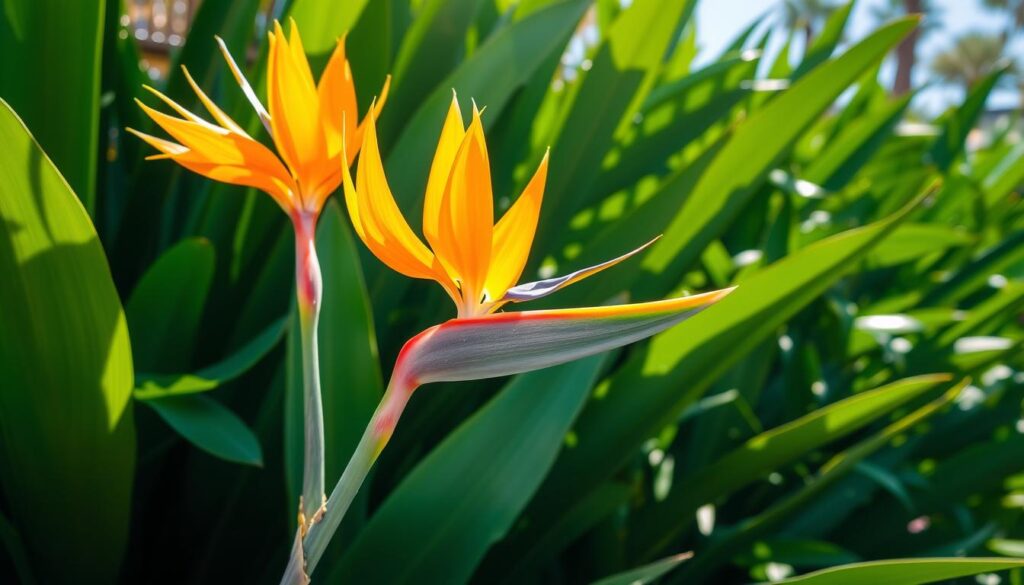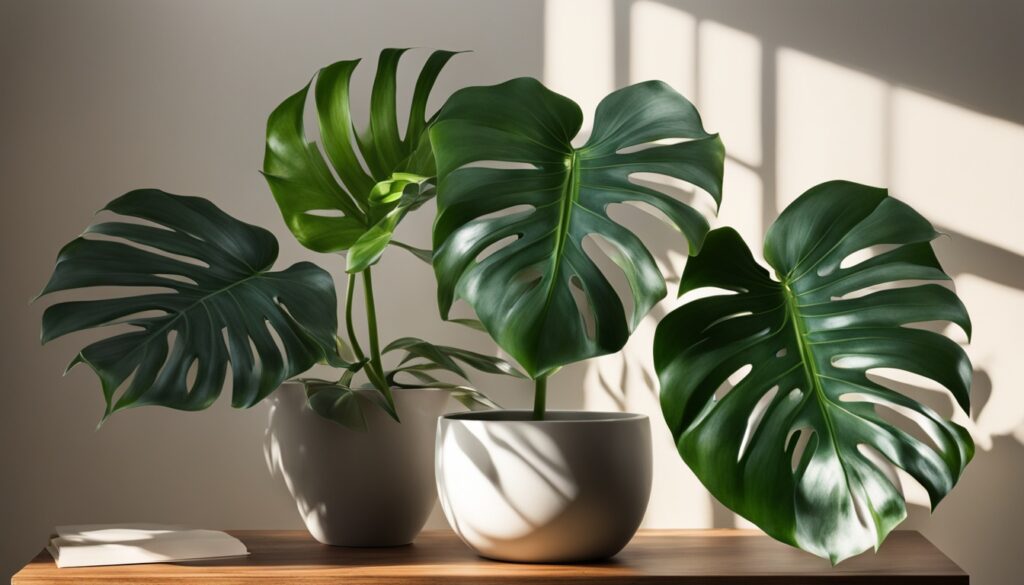Are you fascinated by the Arizona Bird of Paradise (Caesalpinia pulcherrima)? This desert shrub is a summer highlight in Tucson, Arizona. Its bright orange-red flowers bloom from March to October. But, do you know how to keep it thriving in the Southwest’s tough climate? Learn the key care and maintenance tips to make your Arizona Bird of Paradise flourish.
Key Takeaways
- The Arizona Bird of Paradise is a hardy, drought-tolerant shrub that can grow up to 8 feet tall and wide.
- It requires full sun exposure and well-draining soil for optimal growth and blooming.
- This plant is cold-hardy down to 28°F, but will shed leaves below 32°F.
- Proper watering, pruning, and pest management are crucial for the long-term health of the Arizona Bird of Paradise.
- With the right care, this stunning plant can be a stunning addition to your Tucson landscape for years to come.
Introduction to Arizona Bird of Paradise
The Arizona Bird of Paradise is a beautiful tropical plant from South Africa. It loves Arizona’s warm, sunny weather. In Arizona, you’ll find two main types: the Red Bird of Paradise and the Yellow Bird of Paradise.
Natural Habitat and Origins
The Bird of Paradise comes from South Africa’s sunny savannas and coasts. It has adapted well to Arizona’s dry desert. This makes it a favorite for gardeners and landscapers in the state.
Common Varieties in Arizona
- Red Bird of Paradise (Caesalpinia pulcherrima): This flowering shrub can grow up to 6 feet tall. It has vibrant orange-red blooms that are common in low desert areas.
- Yellow Bird of Paradise: This variety can grow 6 to 10 feet tall. It has cheerful yellow flowers and medium green, compound leaves.
Plant Characteristics
The Arizona Bird of Paradise looks lush and tropical. Its leaves are medium green and can be up to 20 inches long. Each leaf has nine sections with up to twelve pairs of small, delicate leaflets.
The plant’s flowers are striking. They bloom in the cooler months and can be up to 20 inches long. They add a vibrant touch to any landscape.
The Arizona Bird of Paradise is tough and loves Arizona’s dry climate. It’s a favorite among gardeners and landscapers. Its unique look and stunning flowers make it a standout in any garden.
Understanding the Arizona Bird of Paradise Plant
The Arizona Bird of Paradise is a stunning shrub that loves the hot, sunny Southwest. It’s part of the Caesalpinia genus and grows fast. It’s known for its vibrant foliage and beautiful flowers. If you want to bring a bit of the tropics to your arizona bird of paradise planting or improve your bird of paradise arizona landscaping, knowing this plant is essential.
This plant comes from Central America and loves the dry Southwest. It does well in many light conditions, from full sun to partial shade. But it really shines in lots of sunlight. Its lush, deep-green leaves and elegant stems make it a standout, even when it’s not flowering.
While it might not bloom as much indoors because of lack of light, its leaves are still beautiful. To keep it healthy, water it regularly and mist it often to increase humidity. By knowing what this hardy shrub needs, you can make sure it thrives in your Arizona garden. It will add a tropical touch to your outdoor space.
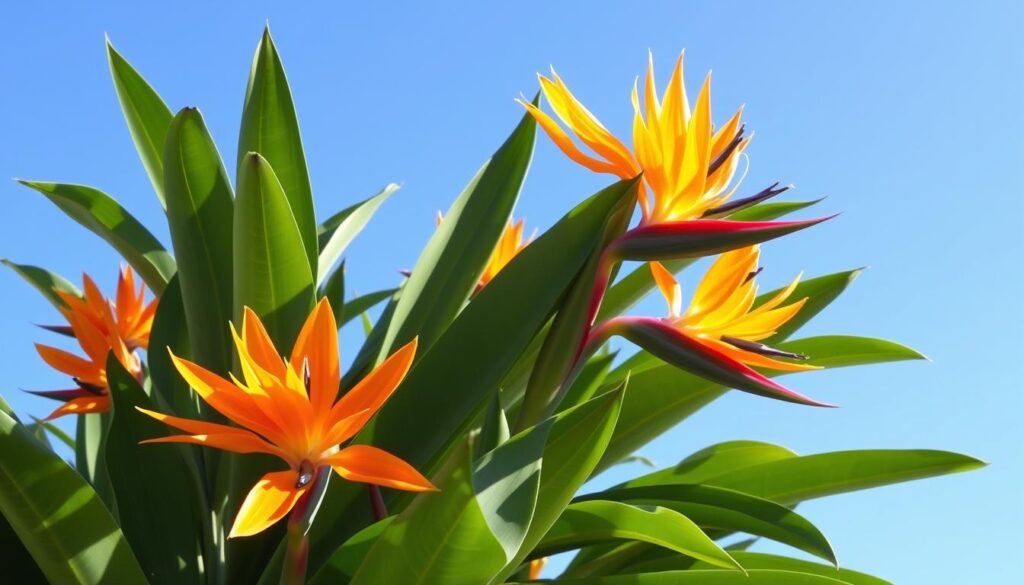
“The Arizona Bird of Paradise is a true testament to the adaptability of nature, thriving in the harshest of climates and captivating all who behold its beauty.”
Best Growing Conditions for Bird of Paradise in Arizona
If you want to grow the beautiful arizona bird of paradise or check out different types, knowing the best growing conditions is key. These tropical plants need specific temperatures, light, and soil to thrive. Arizona’s climate is perfect for them.
Optimal Temperature Range
The arizona bird of paradise can handle cold as low as 25-30 degrees Fahrenheit. But they love warmer weather, above 60°F. In Arizona’s hot summers, they can take the sun and heat without a problem.
Sunlight Requirements
Bird of paradise plants need lots of sunlight to grow well. In Southern California, they can take direct sun. But in Arizona’s hot summers, some shade helps prevent leaf burn.
Soil Conditions
They like soil that drains well and is a bit rich in nutrients. Stay away from heavy clay soil to avoid waterlogging and root rot. For indoor plants, use a good potting mix and make sure the pot has holes for drainage.
“The Bird of Paradise is a true masterpiece of nature, captivating the senses with its vibrant colors and unique form. With the right growing conditions, these plants can flourish in the sunny, arid climate of Arizona, bringing a touch of the tropics to your landscape.”
Seasonal Care Guide
The arizona bird of paradise is a stunning plant that needs special care all year. It’s important to know what it needs in each season to keep it looking great and growing well.
Summer Care
In summer, water your arizona bird of paradise plant every week. Make sure the soil is moist but not too wet. Also, protect it from the strong sun, as it likes bright, indirect light.
Spring and Fall Care
In spring and fall, you can water your plant every other week. The weather is milder, so it doesn’t need as much water.
Winter Care
In winter, water your plant at least once a month. Be careful to keep it away from frost and cold. Prune it during winter to shape and control its size.
To make your bird of paradise plant look new again, cut it back every two years. This will help it grow strong and healthy.
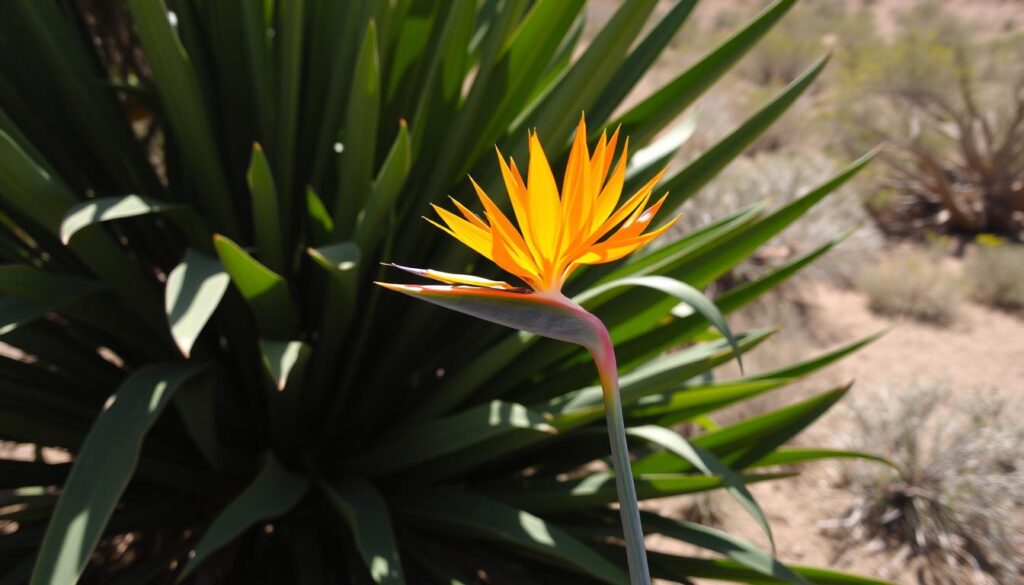
By following these care tips, you can keep your arizona bird of paradise happy and healthy. It will add beauty to your outdoor space all year round.
Water Requirements and Irrigation Tips
Keeping the right water balance is key for your arizona bird of paradise to grow well. These plants like moist soil but not too wet. In spring and summer, water them every day, letting the pot drain well.
Watering Schedule
Stick to a regular watering schedule for moist soil. Water your arizona bird of paradise daily in spring and summer. In fall and winter, water a few times a week. Change your schedule based on temperature and humidity.
Drainage Considerations
Drainage is crucial to avoid waterlogging and root rot in your arizona bird of paradise. Make sure the pot has holes for water to drain. Watch for signs of too much water, like yellow or mushy leaves.
Humidity Management
Arizona bird of paradise plants love humid air. Mist their leaves often to boost humidity. You can also use a pebble tray or humidifier, especially in dry winter months.
By following these tips, you’ll give your arizona bird of paradise the best care. It will have lush leaves and beautiful flowers.
“Consistent, proper watering is the key to keeping an arizona bird of paradise plant healthy and thriving.”
Soil Preparation and Fertilization Methods
To grow healthy arizona bird of paradise plants, you need the right soil and nutrients. For plants in pots, a mix that drains well is key to avoid waterlogged roots. If your plants are in the ground, make sure the soil drains well too.
Feed your arizona bird of paradise with a slow-release organic fertilizer every spring. In the growing season, add a liquid fertilizer once a week. These plants love to eat and need lots of nutrients to thrive.
- Use a well-draining potting mix for container plants
- Ensure outdoor soil has good drainage
- Apply a slow-release organic fertilizer in spring
- Feed weekly with a liquid fertilizer during the growing season
- Arizona bird of paradise are heavy feeders and require regular nutrients
By following these tips, you can give your arizona bird of paradise the best chance to grow. They will have beautiful leaves, bright flowers, and stay healthy.
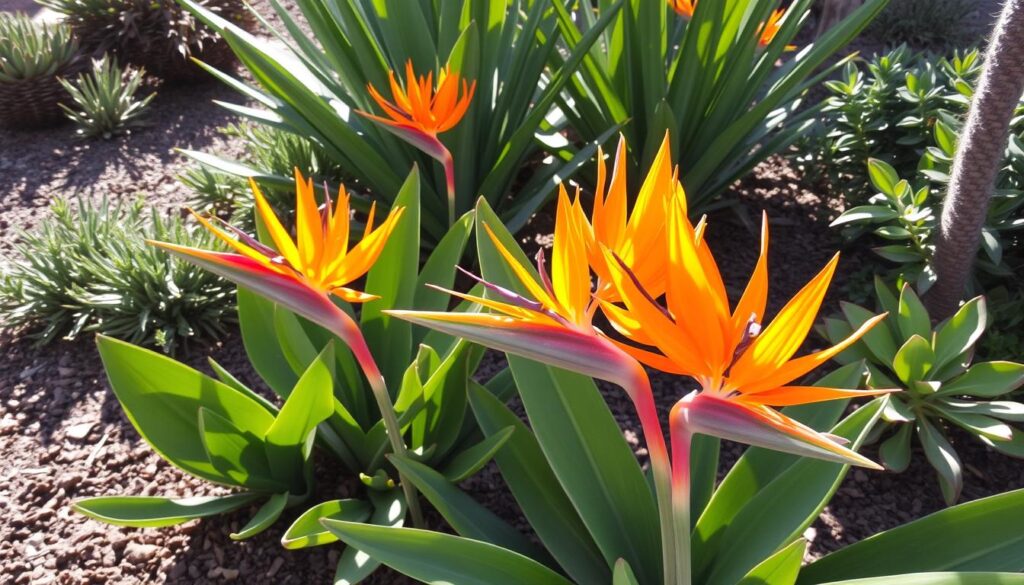
“Proper soil and nutrient management is the foundation for thriving arizona bird of paradise plants.”
Pruning and Maintenance Techniques
To keep your arizona bird of paradise looking great, you need to prune it regularly. It’s important to prune at the right time and use the right tools. This helps the plant grow well and bloom.
Timing for Pruning
Prune your arizona bird of paradise in the winter, early spring before new growth starts. This lets the plant heal and grow strong in the spring.
Tools and Methods
- Use sharp, clean pruning shears or loppers for clean cuts.
- Avoid hedge trimmers to prevent jagged cuts that can get sick.
- For big branches, a pruning saw is needed for precise cuts.
- Always sterilize your tools to stop disease and pests.
Dead Growth Removal
Check your arizona bird of paradise often and remove dead or damaged parts. This makes the plant look better and keeps it healthy.
When you prune, take off old flower stalks, damaged leaves, and any crossing stems. Make cuts just above the main plant, leaving a small piece to encourage new growth.
Remember, arizona bird of paradise plants are tough but need care. Don’t prune too much at once. Remove no more than one-third of the plant each season to keep it healthy.
Common Pests and Diseases
The arizona bird of paradise is a tough plant, but it can still get sick. Keeping an eye on your plants and acting fast is important. This helps your arizona bird of paradise stay healthy and strong.
Aphids, scale insects, and whiteflies are big worries. These pests drink the sap, causing plants to grow poorly and turn colors. Use insecticidal soap or systemic pesticides to fight these pests.
Botrytis cinerea, or gray mold, is another common disease. It makes flowers and leaves turn dark and fuzzy. To fight it, improve air flow and remove any sick parts of the plant.
- Root rot is a big problem for arizona bird of paradise plants. It happens when the soil is too wet. Make sure the soil drains well and don’t water too much.
- Fungal leaf spot diseases cause dark spots on leaves. Good air flow and dry leaves help prevent these diseases.
- Ralstonia solanacearum, a soil-borne bacterium, causes bacterial wilt. It can live in the soil for up to two years. Stopping it from spreading is key, as sick plants often die.
Watching your plants closely and acting quickly is key. Keeping them in the best conditions helps them stay healthy. By being proactive, you can make sure your arizona bird of paradise plants thrive for a long time.
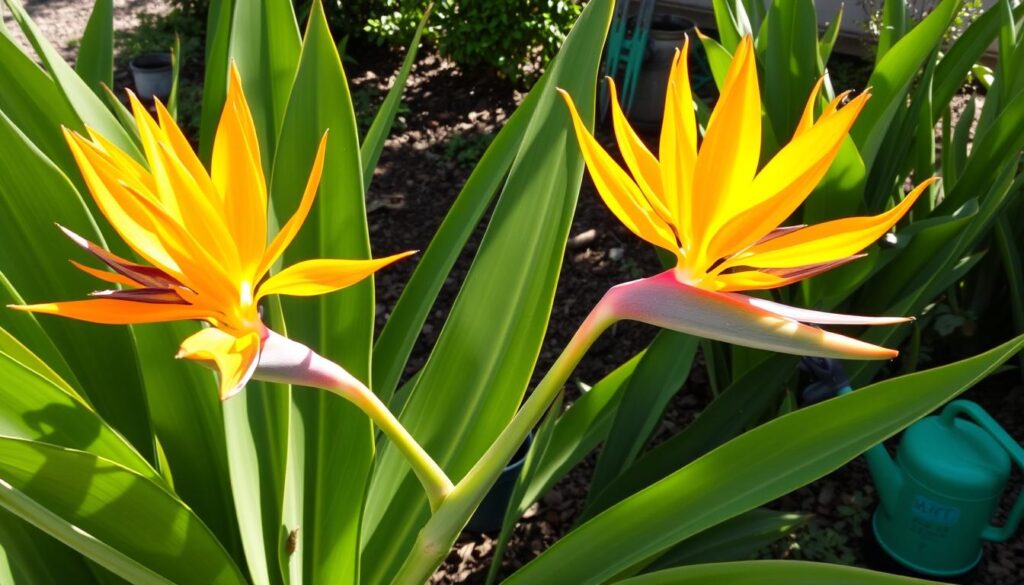
Propagation Methods
There are two main ways to propagate the arizona bird of paradise: division and seed propagation. These methods help you grow more plants or share them with others. Knowing how to do this is essential for successful arizona bird of paradise growing and arizona bird of paradise planting.
Division Technique
The division method involves separating offshoots from the main plant. Look for healthy offshoots with at least three leaves. Then, gently divide the rhizome to create new plants.
This process takes a few weeks or months for the new plants to settle in. So, be patient.
Seed Propagation
Seed propagation is a rewarding method that takes more time and effort. Start by soaking the seeds in warm water for 24-48 hours. This softens the seed coat.
Next, nick or lightly sand the seed coat to help it germinate. Plant the seeds in well-draining, loamy soil. Keep the soil moist until germination, which can take up to two months.
| Propagation Method | Time to Establish | Soil Requirements | Humidity Needs |
|---|---|---|---|
| Division | Weeks to Months | Loamy with sand or perlite | At least 85% |
| Seed Propagation | 1 to 2 months | Well-draining, loamy | At least 85% |
For both methods, keeping the right growing conditions is key. This includes the right temperature, light, and soil. These conditions help new arizona bird of paradise plants thrive.
“Propagation is a rewarding way to expand your arizona bird of paradise collection and share the joy of this vibrant plant with others.”
Landscaping with Arizona Bird of Paradise
The Arizona Bird of Paradise is a vibrant addition to desert landscapes. It’s perfect as accent shrubs, bringing tropical flair to your garden. Its eye-catching flowers and lush foliage make a striking visual impact, whether planted alone or in groups.
Remember the mature size of these plants. Give them enough space to spread and grow, as they can reach up to 20 feet wide. Proper placement ensures their beauty is showcased without causing obstruction or overgrowth.
Varieties for Desert Landscapes
The Arizona Bird of Paradise comes in several varieties, each with unique traits. The Red Bird of Paradise (Caesalpinia pulcherrima) is known for its vibrant red blooms and can handle high temperatures and dry conditions. The Yellow Bird of Paradise (Caesalpinia gilliesii) and Mexican Bird of Paradise (Caesalpinia mexicana) also fit well in desert landscapes, with different flower colors and growth habits.
Placement and Maintenance
- Place the Arizona Bird of Paradise in sunny spots, as they love full sun or light shade.
- Make sure the soil drains well to avoid root rot and other moisture problems.
- Prune the plants often to keep their shape and encourage new growth, especially before winter.
- Water them regularly, adjusting how often based on the variety and your local climate.
Adding the Arizona Bird of Paradise to your desert landscape creates a stunning and easy-to-care-for oasis. It will impress both you and your guests.
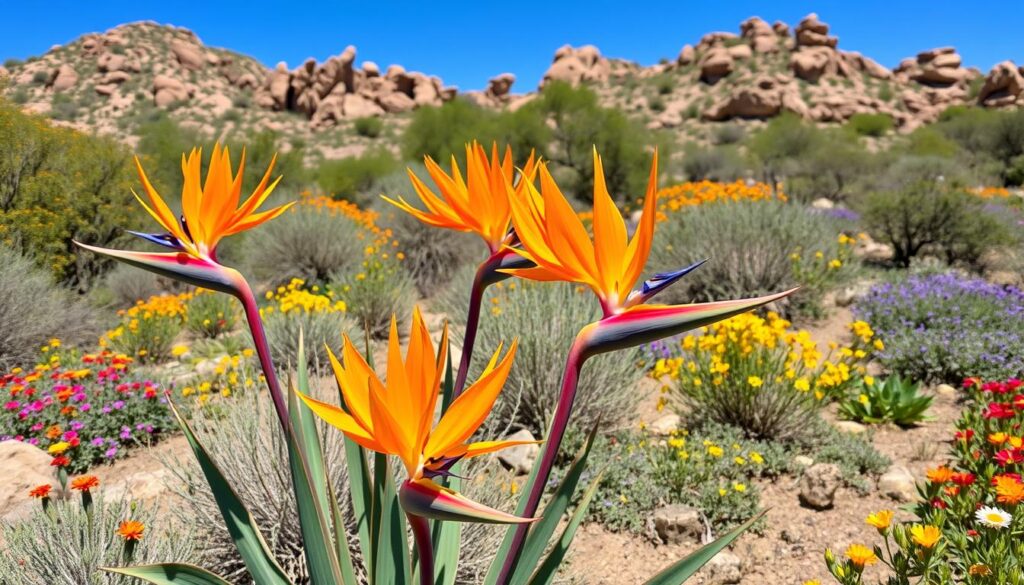
“The Arizona Bird of Paradise adds a touch of the tropics to any desert garden, creating a lush and vibrant backdrop for your outdoor living spaces.”
Winter Protection Strategies
The Arizona Bird of Paradise loves the sun but needs protection in the cold months. Even though the bird of paradise arizona climate is usually mild, freezing temperatures can harm the plant.
If you live in an area with long freezes, move your arizona bird of paradise indoors. This keeps it safe from the cold. For shorter cold spells in Zone 9, a few steps can help your Bird of Paradise stay healthy.
- Prune the stems to about 12 inches above the ground to protect them from the elements.
- Use a thick layer of mulch, like leaf litter or straw, to keep the soil warm and moist.
- Put a breathable row cover over the plant to shield it from frost and wind.
When spring comes and the frost is gone, take off the covers. This lets your Arizona Bird of Paradise enjoy the sun and grow lush again.
“Proper winter preparation is key to ensuring the long-term health and success of your Arizona Bird of Paradise.”
By using these arizona bird of paradise care tips, your plant will thrive all year. A bit of extra care in the cold months means you can enjoy the Arizona Bird of Paradise for many seasons.
Container Growing Guidelines
The Arizona bird of paradise is a stunning tropical plant with iconic orange and blue flowers. It thrives in containers with the right care. Whether on a patio, balcony, or indoors, picking the right pot and knowing when to repot is key.
Pot Selection for Arizona Bird of Paradise
The pot size is crucial for the plant’s growth. For plants up to 4 feet tall, choose a 10-inch pot. For those up to 6 feet, go for a 14-inch pot. Make sure the pot has good drainage to avoid waterlogged soil and root rot.
Repotting Tips for Arizona Bird of Paradise
Repot your Arizona bird of paradise every spring. This gives the roots room to grow and ensures it gets the nutrients it needs. When repotting, pick a pot 2 to 3 inches wider than the old one. Be gentle with the roots. Let the plant get slightly pot-bound to encourage more blooms.
By following these guidelines, you can grow a beautiful Arizona bird of paradise. Enjoy its vibrant, tropical beauty in your outdoor or indoor space.
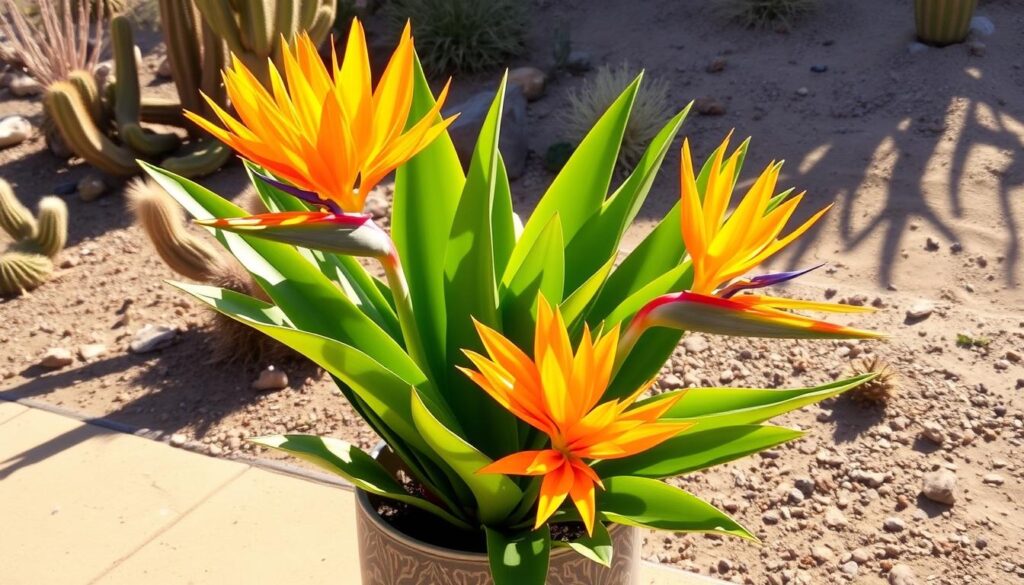
Blooming Cycle and Flower Care
The Arizona bird of paradise blooms in late winter or early spring. It takes 4-5 years for these plants to flower. Once they do, the blooms last about three weeks, brightening any garden.
To get more flowers, make sure the plant gets 6 hours of sunlight daily. Keeping it in a pot-bound state and feeding it regularly helps too. Fertilize every month or two in spring and summer to keep it healthy and blooming.
With the right care, the arizona bird of paradise blooms beautifully. It adds vibrant colors to your garden for months. By meeting its needs, you can enjoy these tropical flowers in your own space.
